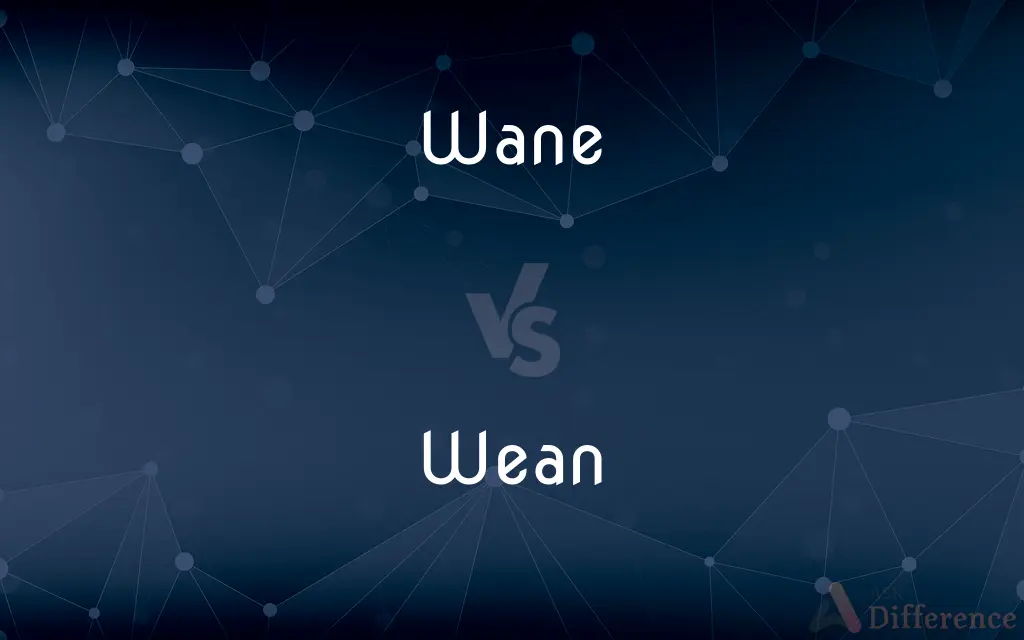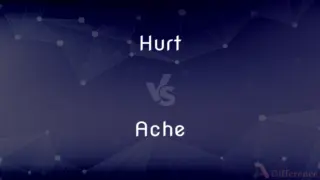Wane vs. Wean — What's the Difference?
By Maham Liaqat & Urooj Arif — Updated on February 29, 2024
Wane means to decrease in size, intensity, or extent, used to describe the diminishing phase of the moon or a decline in interest. Wean refers to the gradual process of stopping breastfeeding or accustoming someone to manage without dependent on.

Difference Between Wane and Wean
Table of Contents
ADVERTISEMENT
Key Differences
Wane and wean are two verbs that, despite their phonetic similarity, convey distinctly different actions and processes. The former, wane, is primarily associated with a decline or decrease. For example, when the visible portion of the moon decreases after a full moon, it is said to wane. Similarly, when enthusiasm, power, or popularity starts to diminish, we also use the term wane to describe this gradual reduction. The essence of waning is a reduction in strength, power, visibility, or interest.
Wean is a term that originated from the practice of introducing a baby or young animal to food other than its mother's milk, marking the transition from breastfeeding or bottle-feeding to a solid diet. Metaphorically, it extends to describe the process of making someone accustomed to doing without something they have become dependent on, whether it's a habit, a belief, or reliance on a particular object or person. Weaning is about gradually reducing dependence with the goal of eventual independence.
Wane captures the essence of a decline or diminishment over time, often without the active intervention of an external agent, wean implies an intentional, often carefully managed process of transition or detachment from a state of dependency. The action of weaning suggests a proactive approach to change, usually driven by growth, development, or a shift towards self-sufficiency.
The difference in their usage reflects these distinct concepts; wane is often used in contexts where natural, inevitable declines are observed, whereas wean is used in scenarios requiring guided adjustment or detachment from a previous state of dependency. Both terms, though similar sounding, thus navigate different aspects of change and transition, one marking a natural decrease and the other a deliberate process towards independence.
Comparison Chart
Definition
To decrease in size, intensity, or extent.
To accustom (someone) to managing without something on which they have become dependent.
ADVERTISEMENT
Context
Often used to describe natural declines or reductions.
Used in the context of breastfeeding or dependency on a substance, habit, or belief.
Process
Passive and often natural or inevitable.
Active and involves a deliberate effort or intervention.
Example Usage
The moon wanes after a full moon.
Babies are usually weaned off milk to solid foods.
Outcome
Reduction or diminishment.
Gradual independence from a previous dependency.
Compare with Definitions
Wane
The diminishing phase of the moon.
The moon wanes over the fortnight following a full moon.
Wean
To transition a baby from breastfeeding to solid food.
They started to wean their baby at six months.
Wane
To reduce in extent or coverage.
The shadows waned as the sun rose higher in the sky.
Wean
To end reliance on something.
The company plans to wean itself off fossil fuels.
Wane
To decrease in power or magnitude.
Interest in the project began to wane after several delays.
Wean
To gradually reduce use or consumption.
She's trying to wean herself off caffeine.
Wane
To decline in intensity or strength.
As the evening progressed, the storm's fury waned.
Wean
To accustom to managing without something.
He was weaned on classical music, finding other genres less appealing.
Wane
To fade away or diminish in influence.
The king's authority waned in his final years.
Wean
Accustom (an infant or other young mammal) to food other than its mother's milk.
Wane
(of the moon) have a progressively smaller part of its visible surface illuminated, so that it appears to decrease in size.
Wean
To detach from a dependency.
The program aims to wean teenagers off addictive substances.
Wane
(of a state or feeling) decrease in vigour or extent; become weaker
Confidence in the dollar waned
Wean
A young child.
Wane
The amount by which a plank or log is bevelled or falls short of a squared shape
I cut the log into slabs without removing the outside wane
Wean
To accustom (the young of a mammal) to take nourishment other than by suckling.
Wane
To decrease gradually in size, number, strength, or intensity
Interest in the subject waned.
Wean
To detach gradually from that to which one is strongly habituated or devoted
She weaned herself from cigarettes.
Wane
To show a progressively smaller illuminated area, as the moon does in passing from full to new.
Wean
To accustom to something from an early age. Often used with on
“The northerners among the refugees ... were weaned on harsh weather and infertile soils and are known for their rigorous work ethic” (Lowell Weiss).
Wane
To approach an end
The day began to wane.
Wean
(transitive) To cease giving breast milk to an offspring; to accustom and reconcile (a child or young animal) to a want or deprivation of mother's milk; to take from the breast or udder.
The cow has weaned her calf.
Wane
The act or process of gradually declining or diminishing.
Wean
(intransitive) To cease to depend on the mother's milk for nutrition.
The kittens are finally weaning.
Wane
A time or phase of gradual decrease.
Wean
To cause to quit something to which one is addicted, dependent, or habituated.
He managed to wean himself off heroin.
Wane
The period of the decrease of the moon's illuminated visible surface.
Wean
To cease to depend.
She is weaning from her addiction to tobacco.
Wane
A defective edge of a board caused by remaining bark or a beveled end.
Wean
To raise, to help grow toward maturity
Wane
A gradual diminution in power, value, intensity etc.
Wean
A small child.
Wane
The lunar phase during which the sun seems to illuminate less of the moon as its sunlit area becomes progressively smaller as visible from Earth.
Wean
To accustom and reconcile, as a child or other young animal, to a want or deprivation of mother's milk; to take from the breast or udder; to cause to cease to depend on the mother nourishment.
And the child grew, and was weaned; and Abraham made a great feast the same day that Isaac was weaned.
Wane
(literary) The end of a period.
Wean
Hence, to detach or alienate the affections of, from any object of desire; to reconcile to the want or loss of anything.
The troubles of age were intended . . . to wean us gradually from our fondness of life.
Wane
(woodworking) A rounded corner caused by lack of wood, often showing bark.
Wean
A weanling; a young child.
I, being but a yearling wean.
Wane
A child.
Wean
Gradually deprive (infants) of mother's milk;
She weaned her baby when he was 3 months old and started him on powdered milk
Wane
A house or dwelling.
Wean
Detach the affections of
Wane
(intransitive) To progressively lose its splendor, value, ardor, power, intensity etc.; to decline.
Wane
(intransitive) Said of light that dims or diminishes in strength.
Wane
Said of the Moon as it passes through the phases of its monthly cycle where its surface is less and less visible.
Wane
(intransitive) Said of a time period that comes to an end.
Wane
To decrease physically in size, amount, numbers or surface.
Wane
To cause to decrease.
Wane
To be diminished; to decrease; - contrasted with wax, and especially applied to the illuminated part of the moon.
Like the moon, aye wax ye and wane.Waning moons their settled periods keep.
Wane
To decline; to fail; to sink.
You saw but sorrow in its waning form.
Land and trade ever will wax and wane together.
Wane
To cause to decrease.
Wane
The decrease of the illuminated part of the moon to the eye of a spectator.
Wane
Decline; failure; diminution; decrease; declension.
An age in which the church is in its wane.
Though the year be on the wane.
Wane
An inequality in a board.
Wane
The natural curvature of a log or of the edge of a board sawed from a log.
Wane
A gradual decline (in size or strength or power or number)
Wane
Grow smaller;
Interest in the project waned
Wane
Become smaller;
Interest in his novels waned
Wane
Decrease in phase;
The moon is waning
Common Curiosities
Can "wane" be used in a positive context?
Rarely, as "wane" typically implies a reduction or decline, which is often viewed negatively, though it can be neutral depending on the context (e.g., waning of pain).
Can societies or cultures be weaned off certain practices?
Yes, societies can be weaned off practices or dependencies through gradual change, education, and policy shifts.
Can a person's interest "wane" in something they're weaning off of?
Yes, as someone is weaned off something, their interest or dependency on it can wane, reflecting both a decrease in interest and the process of detachment.
How long does it typically take to wean someone off something?
The timeframe can vary widely depending on the dependency and the individual, ranging from weeks to months or longer.
Is the waning moon considered less powerful in cultural or astrological contexts?
In some cultures and astrological beliefs, the waning moon is considered a time for release, reflection, and the lessening of influence.
Is "wean" only applicable to infants and food?
No, "wean" can apply to anyone or anything being gradually detached from a dependency, not just infants transitioning from milk to solid food.
Does "wane" imply a complete disappearance?
Not necessarily; "wane" implies a decrease but not always a complete disappearance. Something can wane and still remain present, albeit in a diminished capacity.
Can "wean" be used in a context unrelated to substance or habit?
Yes, "wean" can be used metaphorically to describe reducing reliance on or interest in non-substance-related dependencies, such as certain types of behavior or thinking patterns.
Can technology or businesses undergo a weaning process?
Yes, businesses and technologies often undergo weaning processes as they transition away from outdated practices or technologies toward newer, more sustainable options.
Is it possible for something to wane and then return to its original state?
While "wane" describes a process of decrease, it does not preclude the possibility of resurgence or return to a former state, though such a process would not typically be described using "wane."
Share Your Discovery

Previous Comparison
Hurt vs. Ache
Next Comparison
Grandmother vs. NannaAuthor Spotlight
Written by
Maham LiaqatCo-written by
Urooj ArifUrooj is a skilled content writer at Ask Difference, known for her exceptional ability to simplify complex topics into engaging and informative content. With a passion for research and a flair for clear, concise writing, she consistently delivers articles that resonate with our diverse audience.














































